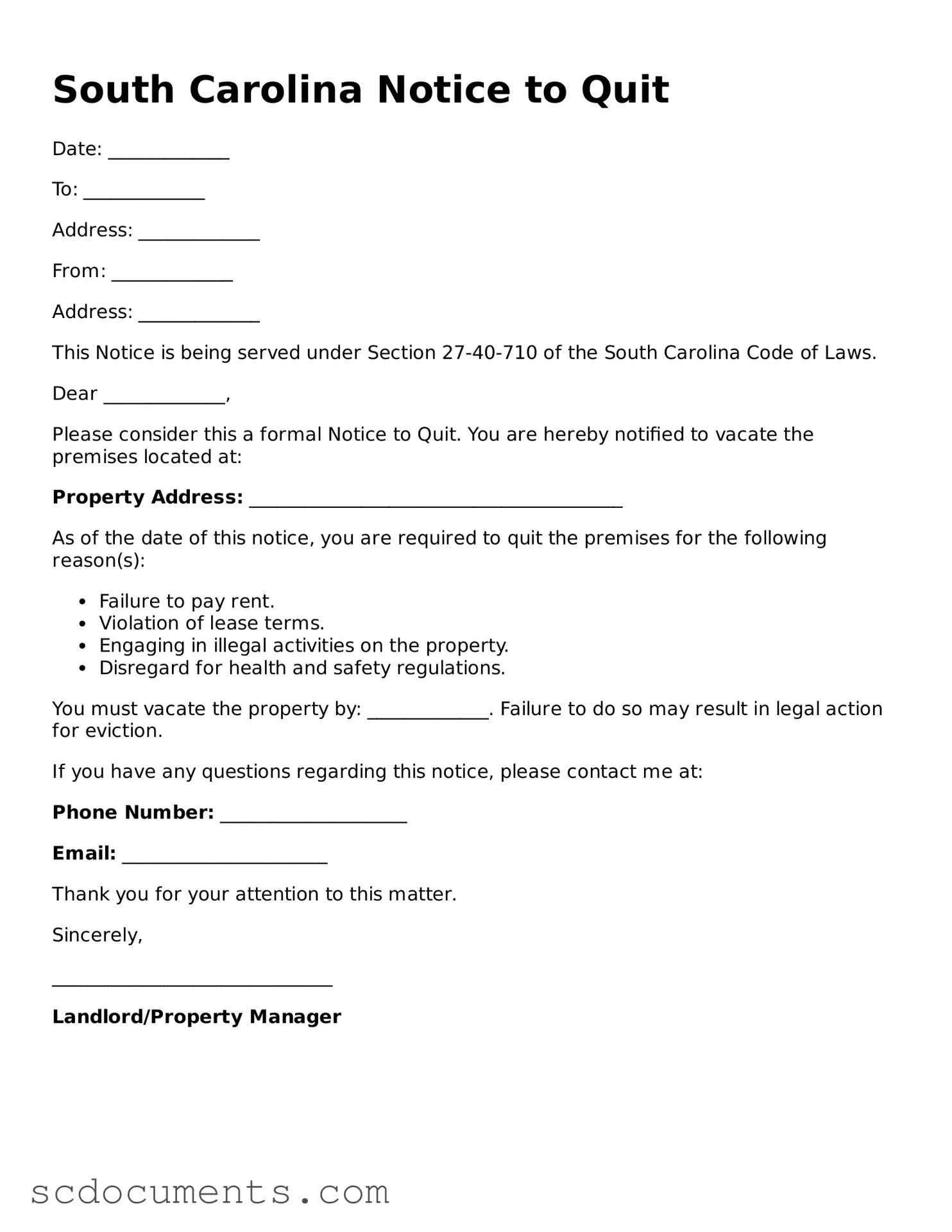Legal South Carolina Notice to Quit Form
Dos and Don'ts
When filling out the South Carolina Notice to Quit form, it's important to follow certain guidelines to ensure accuracy and compliance. Here are some dos and don'ts to consider:
- Do provide accurate tenant information, including full names and addresses.
- Do clearly state the reason for the notice, such as non-payment of rent or lease violations.
- Do sign and date the form to validate it.
- Do keep a copy of the completed form for your records.
- Don't use vague language; be specific about the issues leading to the notice.
- Don't forget to check local laws for any additional requirements.
- Don't leave any sections of the form blank; complete all necessary fields.
- Don't deliver the notice without following the proper delivery methods outlined in state law.
File Data
| Fact Name | Details |
|---|---|
| Purpose | The South Carolina Notice to Quit form is used by landlords to formally notify tenants to vacate the rental property. |
| Governing Law | This form is governed by South Carolina Code of Laws, Title 27, Chapter 40, which outlines landlord-tenant relationships. |
| Notice Period | Typically, landlords must provide a notice period of at least 14 days for non-payment of rent before initiating eviction proceedings. |
| Delivery Methods | The notice can be delivered in person, sent via certified mail, or posted on the property, ensuring the tenant receives it. |
| Tenant Rights | Tenants have the right to respond to the notice and may contest the eviction in court if they believe it is unjustified. |
| Form Availability | The South Carolina Notice to Quit form can typically be found online or obtained through local legal aid organizations. |
Documents used along the form
When dealing with rental agreements and tenant issues in South Carolina, various forms and documents may accompany the Notice to Quit. Each of these documents serves a specific purpose in the eviction process or in managing rental properties. Below is a list of common forms that are often used alongside the Notice to Quit.
- Lease Agreement: This document outlines the terms and conditions of the rental arrangement between the landlord and tenant. It details rent amount, duration, and responsibilities of both parties.
- Notice of Rent Due: A formal notice sent to the tenant when rent has not been paid. It typically specifies the amount owed and the deadline for payment.
- Eviction Complaint: This legal document initiates the eviction process in court. It states the reasons for eviction and requests a hearing.
- Summons: Issued by the court, this document informs the tenant of the eviction hearing date and their right to respond.
- Affidavit of Service: A sworn statement confirming that the Notice to Quit or other legal documents were delivered to the tenant.
- Response to Eviction Complaint: A document filed by the tenant to contest the eviction. It outlines the tenant's defense and reasons for remaining in the property.
- Hold Harmless Agreement: When engaging in activities that may involve risks, it is important to have a complete Hold Harmless Agreement template to protect all parties involved from liability.
- Judgment Order: A court document that officially concludes the eviction case, determining whether the landlord or tenant prevails.
- Writ of Possession: This order allows the landlord to regain possession of the rental property after a judgment in their favor.
Understanding these documents can help landlords and tenants navigate the eviction process more effectively. Each form plays a crucial role in ensuring that rights are protected and procedures are followed correctly.
Key takeaways
When dealing with the South Carolina Notice to Quit form, it is crucial to understand its purpose and the proper way to use it. Here are some key takeaways:
- The Notice to Quit is a formal document used by landlords to inform tenants that they must vacate the rental property.
- Ensure that the form is filled out completely, including the tenant's name, address, and the reason for the notice.
- Delivery of the notice must be done properly; it can be hand-delivered or sent via certified mail to ensure it is received.
- Understand the timeframe: South Carolina law generally requires a minimum notice period, which varies depending on the reason for eviction.
- Keep a copy of the completed Notice to Quit for your records. This can be crucial if further legal action becomes necessary.
Other South Carolina Templates
Free Printable Golf Cart Bill of Sale - The bill of sale acts as proof of ownership transfer for the golf cart.
Filing a Missouri 5177 form is crucial for those who need to rectify inaccuracies on their vehicle's title, allowing for seamless updates that ensure proper ownership details are maintained. To access the necessary paperwork for these adjustments, you can refer to All Missouri Forms, where you will find the Missouri 5177 form available for completion and submission to the Department of Revenue.
Scdmv Bill of Sale - Supports various payment methods and terms for the sale.
